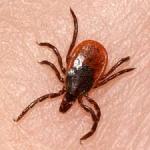 Landscapers, arborists, tree wardens, lawn care professionals, grounds managers, and essentially any professionals working outdoors runs the risk of encountering, being bitten by, and contracting a tick-associated disease from multiple tick species in Massachusetts. This conference brings together speakers who will discuss what is currently known about tick and tick-associated diseases in Massachusetts and surrounding states, habitat and winter survival of ticks, personal protection, and the management of ticks in landscapes.
Landscapers, arborists, tree wardens, lawn care professionals, grounds managers, and essentially any professionals working outdoors runs the risk of encountering, being bitten by, and contracting a tick-associated disease from multiple tick species in Massachusetts. This conference brings together speakers who will discuss what is currently known about tick and tick-associated diseases in Massachusetts and surrounding states, habitat and winter survival of ticks, personal protection, and the management of ticks in landscapes.
Pesticide & Professional Credits
5 pesticide contact hours for all categories and Applicators License.
Association credits: 5 ISA, 5 CTSP, 3 SAF (cat2), 2 MCA, 2 MCLP, and 1 MCH credits.
Registration
Preregistration is required, as space is limited. Cost is $95/$86 per person for three or more registrations from the same company (10% discount). Lunch is on your own, morning coffee will be provided.
To pay by check or PO: Complete the printable registration form and return by mail (there is an additional price reduction to encourage payment by check - see form for amounts).
To pay by credit card: Go to https://umasscafe.irisregistration.com/Form/ticksconf2019.
Agenda
8:00 AM Registration
8:30 AM Welcoming remarks
8:45 AM Updates about Ticks in Massachusetts: Tick Surveillance
Stephen Rich, UMass Laboratory of Medical Zoology
Ticks are not uniformly distributed in time nor space. Different tick species bite at different times of the year in different parts of the country. Complete understanding of best practices aimed at reducing tick exposures is contingent upon understanding where and when ticks are actively seeking human hosts. Current knowledge of these distributions and resources for checking your season and region will be discussed.
9:45 AM Break
10:00 AM Updates about Ticks in Massachusetts: Disease Risk Assessment
Stephen Rich, UMass Laboratory of Medical Zoology
Evidence of a tick bite is an essential component of Tick-Borne Disease (TBD) transmission; however, not all tick bites pose equal risk. Actual infection of human subjects depends upon several factors including the tick species, infection status of the tick, and the duration of tick feeding. These factors will be discussed in the context of current and newly emerged surveillance methodologies that provide means of assessing individual TBD risk.
11:00 AM Habitat, Winter Survival of Ixodes scapularis and Amblyomma americanum and the Establishment of the Lone Star Tick in Connecticut
Kirby C. Stafford III, Connecticut Agricultural Experiment Station
Environmental and ground conditions, particularly in the winter, are critical to survival of Ixodid ticks. We examined the overwintering survival of nymphal Ixodes scapularis and adult Amblyomma americanum in Connecticut and Maine under varying conditions of leaf litter and snow cover. Along with increasing submissions of A. americanum, an established population of adult and nymphal lone star ticks was discovered along coastal CT in June 2017. The establishment and survival of overwintering A. americanum suggests this species will become an increasing public health concern along coastal New England.
12:00 – 1:00 PM Lunch (on your own)
1:00 PM Personal Protection and Ticks: How Industry Professionals Can Protect Themselves
Larry Dapsis, Cape Cod Cooperative Extension
Lyme Disease is the most widely misdiagnosed infectious disease on the books since it resembles a number of other disorders. Emerging diseases like babesiosis and anaplasmosis are on the rise. Personal protection is at the core of tick-borne disease prevention. This presentation will provide an overview of repellents for clothing and skin, including the “all natural” category of products on the market.
2:00 PM Break
2:15 PM Management of Ticks in Landscapes: Mechanical and Chemical Management, Deer Exclusion, and other Research
Kirby C. Stafford III, Connecticut Agricultural Experiment Station
Increasing prevalence of Lyme disease and the emergence of other tick-associated human diseases in the United States have become a major public health concern, as noted in the CDC’s Vital Signs report. As ticks expand their range, more people are exposed to tick bites and tick-borne diseases. A wide variety of prevention and control strategies have been adapted or investigated to reduce human risk of disease. The current status of tick management will be reviewed.
3:15 PM Credits & adjourn